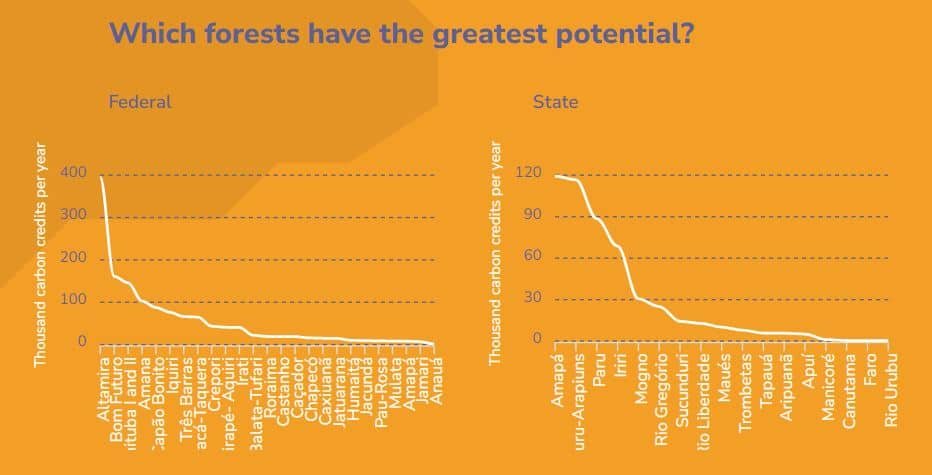Brazil’s Congress passed a bill that will make carbon credits available to private companies with forest concessions, serving a first step in regulating the voluntary carbon market in the country.
The new policy is expected to boost revenue by 43% while generating around $24 million per year from carbon credits.
Brazil’s New Carbon Credit Bill
Though Brazil is home to the largest tropical forest in the world, the country is lagging behind others like Cambodia in generating forest carbon credits. The Amazon country has 20 certified REDD+ projects ongoing but only 2 of them in public forests.
Forest concessions are leasing programs that lease areas of public forest to the private companies. This is to encourage economic activities such as logging that generate income while still keeping the forest standing.
Under the current legislation, only credits from reforestation projects are permitted in forest concession agreements. Allowing the generation of carbon credits in forest concessions may change this scenario.
The new federal law will enable the development of carbon credit projects and other environmental services through forest concession agreements. It prompts the generation of credits resulting from avoided carbon emissions through conservation of natural forests, the so-called REDD+ credits.
In 2006, Brazil’s Public Forest Management Law (Lei de Gestão de Florestas Públicas – LGFP) set up forest concessions and created the Brazilian Forest Service (Serviço Florestal Brasileiro – SFB).
SFB manages forest concessions at the federal level. It is responsible for selecting the forest areas that can be awarded for concession and for monitoring the contracts. Some states, mainly in the Amazon, also have their own concession policies covering state public forests.
- Among the more than 229 million hectares of federal public forests in Brazil, over 5 million hectares are available for concession in 2022. Currently, only a little over 1 million hectares are under federal concession, all of which are in the Amazon.
Boosting Appeal and Revenue
The limited success of the forest leasing program in Brazil suggests a little interest from private investors. But the new bill can help boost the appeal of forest concessions by creating more revenue streams.
According to Jacqueline Ferreira, a manager at Instituto Escolhas, a nonprofit organization that’s party to the bill consultations, the policy will bolster other economic activities involving forestry concessions.
The environmental nonprofit did a study on the potential for REDD+ carbon credits generation in the Amazon. Their analysis includes 37 forest areas that can be leased in the region. They estimated that the leasing program can generate a total of $24 million each year from carbon credit sales.
Here’s their results as to which state and federal forests have the potential to produce carbon credits.

The study also shows that carbon credits can increase Rondônia’s revenue from sustainable timber management in forest concessions by 43%.
Noting this finding, Ferreira said that they use “very conservative math, based on carbon credit prices below the market level.” She added that more rules are necessary to explain how carbon credit generation can happen. But she said that at least 1 year is needed for the first leases to be issued with carbon credits.
The Biggest Stumbling Block
The bill comes as carbon credits from Amazon REDD+ projects have to deal with doubts due to land ownership issues.
For instance, the Jari Pará REDD+ Project in Brazil’s Amazon rainforest has come under scrutiny for selling carbon credits from publicly-owned land without state authorization.
Brazil’s voluntary carbon credit market remains unregulated and the introduced bill may help fix that.
But another nonprofit working on Amazon’s sustainability pointed out that a broader regulation is needed to address issues on the quality of carbon credit projects in the region.
Other experts on the matter said that the bill should make Brazil’s forest leasing programs become profitable. But one big hurdle to that is the strong competition from illegal logging rampant in the Amazon rainforest.
President Luiz Inácio Lula da Silva must sign or veto the bill within 15 days. Lula’s reign focuses on reversing the impacts of deforestation that his predecessor, Jair Bolsonaro, created.
Last week, Lula revealed that the United Nations selected Brazil to host COP30, the global climate meeting, in the Amazonian city of Belém do Pará in 2025. COP is the yearly UN Climate Change Conference wherein nations discuss and agree on measures to deal with the climate. This year’s COP28 will be in Dubai.

